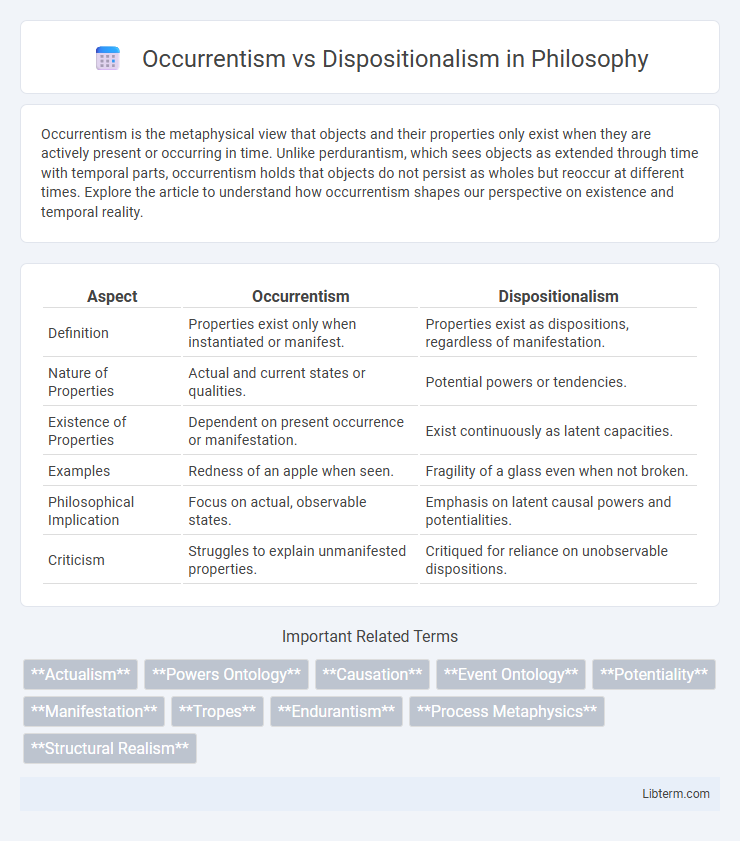Occurrentism is the metaphysical view that objects and their properties only exist when they are actively present or occurring in time. Unlike perdurantism, which sees objects as extended through time with temporal parts, occurrentism holds that objects do not persist as wholes but reoccur at different times. Explore the article to understand how occurrentism shapes our perspective on existence and temporal reality.
Table of Comparison
| Aspect | Occurrentism | Dispositionalism |
|---|---|---|
| Definition | Properties exist only when instantiated or manifest. | Properties exist as dispositions, regardless of manifestation. |
| Nature of Properties | Actual and current states or qualities. | Potential powers or tendencies. |
| Existence of Properties | Dependent on present occurrence or manifestation. | Exist continuously as latent capacities. |
| Examples | Redness of an apple when seen. | Fragility of a glass even when not broken. |
| Philosophical Implication | Focus on actual, observable states. | Emphasis on latent causal powers and potentialities. |
| Criticism | Struggles to explain unmanifested properties. | Critiqued for reliance on unobservable dispositions. |
Introduction to Occurrentism and Dispositionalism
Occurrentism and Dispositionalism represent two fundamental metaphysical perspectives on properties and their manifestations. Occurrentism asserts that properties exist only when they are actively instantiated or occurring, emphasizing the present, tangible state of affairs. Dispositionalism, in contrast, posits that properties primarily exist as dispositions or potentials that may manifest under certain conditions, highlighting the inherent capacities or tendencies embedded within objects.
Historical Background and Philosophical Roots
Occurrentism traces its philosophical roots to the early analytic tradition, emphasizing events and experiences as actual occurrences in time, with key figures like J.L. Austin and D.M. Armstrong shaping its development. Dispositionalism, influenced by Aristotelian metaphysics and later by philosophers such as C.B. Martin and M. Mumford, focuses on inherent powers or tendencies within entities that may manifest under certain conditions. The historical debate between these positions arose from contrasting views on the nature of properties and causation, reflecting deeper metaphysical discussions about actuality versus potentiality.
Defining Occurrentism: Key Concepts
Occurrentism defines mental states as events or occurrences that exist only when they are happening, emphasizing temporality and actualization. Key concepts include the transient nature of mental phenomena and their direct manifestation during specific moments in time. This contrasts with dispositionalism, which views mental states as enduring capacities or dispositions to behave in certain ways under particular conditions.
Dispositionalism Explained: Core Principles
Dispositionalism posits that properties and causal powers are inherently tied to the dispositions or tendencies of objects rather than their actual occurrences. This theory emphasizes that an entity's behavior is best understood through its potential to produce effects under specific conditions, making dispositional properties fundamental to causation. Core principles include the irreducibility of dispositions to categorical properties and the necessity of context or triggering conditions for dispositional manifestations.
Comparing Ontological Commitments
Occurrentism posits that properties and events exist only when they are actively instantiated or occurring, emphasizing temporal actualization as fundamental to ontological commitment. Dispositionalism asserts that properties are inherent dispositions or potentials that persist independently of their manifestation, expanding ontological inventory to include latent abilities or tendencies. The debate centers on whether reality's ontological structure comprises exclusively actual occurrences or also includes enduring dispositional states as equally real components.
Metaphysical Implications in Science and Philosophy
Occurrentism posits that properties exist only when they are actively instantiated, influencing scientific interpretations of time and causality by emphasizing concrete events. Dispositionalism argues that properties are tendencies or potentials, shaping philosophical discussions on modality and grounding laws of nature as intrinsic powers. The metaphysical implications of these views impact how reality's structure is understood, affecting debates on persistence, change, and the nature of physical laws.
Strengths and Weaknesses of Occurrentism
Occurrentism, as a theory of mental states, emphasizes that these states are actively occurring events rather than potential dispositions, providing clarity in explaining conscious experience and behavior in real-time. Its strength lies in addressing the immediacy and dynamism of mental phenomena, making it effective for understanding episodic experiences and cognitive processes. However, occurrentism struggles with accounting for latent mental states and dispositional beliefs that are not currently manifest, limiting its explanatory power regarding enduring traits and potential actions.
Advantages and Critiques of Dispositionalism
Dispositionalism offers the advantage of explaining properties as tendencies or powers that manifest under certain conditions, providing a dynamic understanding of causation and behavior. Critics argue that Dispositionalism struggles with the problem of negative or dormant dispositions and may face difficulties in accounting for the actualization of dispositions without invoking circular explanations. Despite these challenges, Dispositionalism remains influential in metaphysics for its ability to bridge intrinsic properties with observable effects.
Contemporary Debates and Perspectives
Contemporary debates in metaphysics contrast Occurrentism, which holds that mental states exist only when actively experienced, with Dispositionalism, asserting that mental states are enduring dispositions or tendencies. Researchers analyze empirical data from cognitive science and neuroscience to evaluate whether consciousness is best explained as momentary occurrences or as stable underlying capacities. Current perspectives emphasize integrating phenomenological insights with neurobiological evidence to resolve how mental occurrences or dispositions manifest in experience and behavior.
Future Directions in Metaphysical Inquiry
Future directions in metaphysical inquiry regarding Occurrentism versus Dispositionalism emphasize refining concepts of temporal persistence and potentiality by integrating advances in quantum mechanics and process philosophy. Scholars explore the development of hybrid models that reconcile the immediacy of occurrent properties with the latent, enduring nature of dispositional traits. Emerging debates prioritize formalizing the interaction between actual events and inherent capacities to address challenges in causation and modal metaphysics.
Occurrentism Infographic

 libterm.com
libterm.com